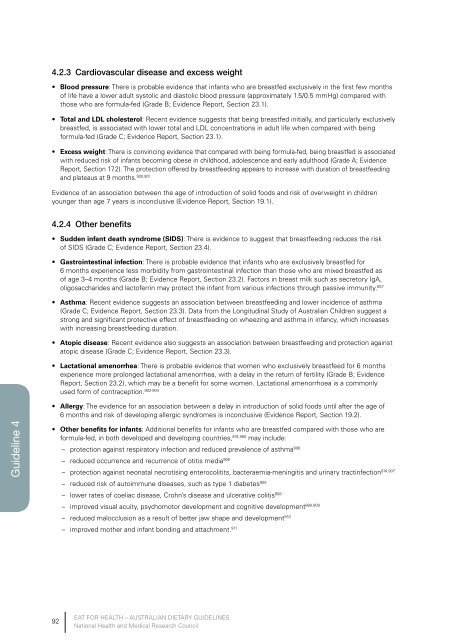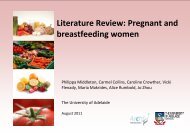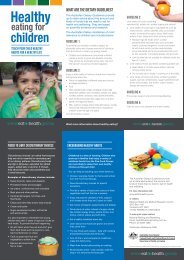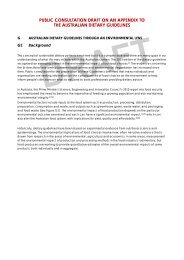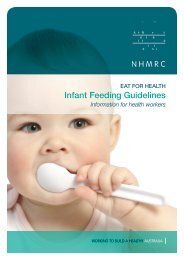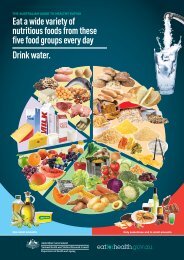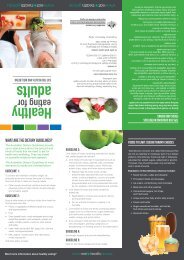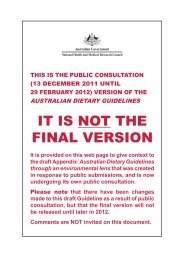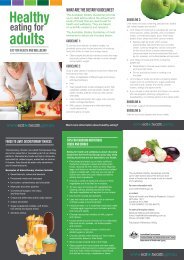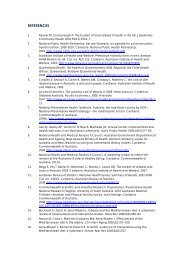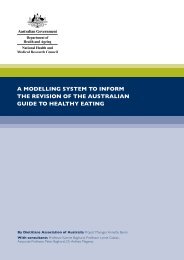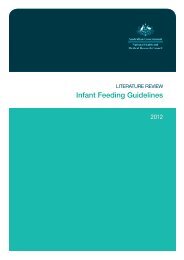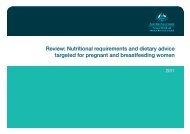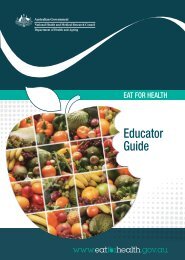Guidelines Dietary - Eat For Health
Guidelines Dietary - Eat For Health
Guidelines Dietary - Eat For Health
- No tags were found...
You also want an ePaper? Increase the reach of your titles
YUMPU automatically turns print PDFs into web optimized ePapers that Google loves.
4.2.3 Cardiovascular disease and excess weight• Blood pressure: There is probable evidence that infants who are breastfed exclusively in the first few monthsof life have a lower adult systolic and diastolic blood pressure (approximately 1.5/0.5 mmHg) compared withthose who are formula-fed (Grade B; Evidence Report, Section 23.1).• Total and LDL cholesterol: Recent evidence suggests that being breastfed initially, and particularly exclusivelybreastfed, is associated with lower total and LDL concentrations in adult life when compared with beingformula-fed (Grade C; Evidence Report, Section 23.1).• Excess weight: There is convincing evidence that compared with being formula-fed, being breastfed is associatedwith reduced risk of infants becoming obese in childhood, adolescence and early adulthood (Grade A; EvidenceReport, Section 17.2). The protection offered by breastfeeding appears to increase with duration of breastfeedingand plateaus at 9 months. 900,901Evidence of an association between the age of introduction of solid foods and risk of overweight in childrenyounger than age 7 years is inconclusive (Evidence Report, Section 19.1).4.2.4 Other benefits• Sudden infant death syndrome (SIDS): There is evidence to suggest that breastfeeding reduces the riskof SIDS (Grade C; Evidence Report, Section 23.4).• Gastrointestinal infection: There is probable evidence that infants who are exclusively breastfed for6 months experience less morbidity from gastrointestinal infection than those who are mixed breastfed asof age 3–4 months (Grade B; Evidence Report, Section 23.2). Factors in breast milk such as secretory IgA,oligosaccharides and lactoferrin may protect the infant from various infections through passive immunity. 657• Asthma: Recent evidence suggests an association between breastfeeding and lower incidence of asthma(Grade C; Evidence Report, Section 23.3). Data from the Longitudinal Study of Australian Children suggest astrong and significant protective effect of breastfeeding on wheezing and asthma in infancy, which increaseswith increasing breastfeeding duration.• Atopic disease: Recent evidence also suggests an association between breastfeeding and protection againstatopic disease (Grade C; Evidence Report, Section 23.3).• Lactational amenorrhea: There is probable evidence that women who exclusively breastfeed for 6 monthsexperience more prolonged lactational amenorrhea, with a delay in the return of fertility (Grade B; EvidenceReport, Section 23.2), which may be a benefit for some women. Lactational amenorrhoea is a commonlyused form of contraception. 902-904• Allergy: The evidence for an association between a delay in introduction of solid foods until after the age of6 months and risk of developing allergic syndromes is inconclusive (Evidence Report, Section 19.2).Guideline 4• Other benefits for infants: Additional benefits for infants who are breastfed compared with those who areformula-fed, in both developed and developing countries, 874,905 may include:––protection against respiratory infection and reduced prevalence of asthma 906––reduced occurrence and recurrence of otitis media 905––protection against neonatal necrotising enterocolitits, bacteraemia-meningitis and urinary tractinfection 874,907––reduced risk of autoimmune diseases, such as type 1 diabetes 905––lower rates of coeliac disease, Crohn’s disease and ulcerative colitis 908––improved visual acuity, psychomotor development and cognitive development 880,909––reduced malocclusion as a result of better jaw shape and development 910––improved mother and infant bonding and attachment. 91192EAT FOR HEALTH – australian dietary guidelinesNational <strong>Health</strong> and Medical Research Council


